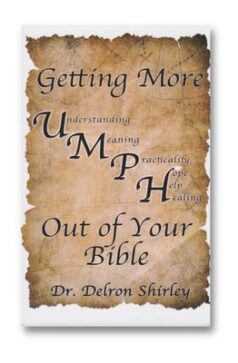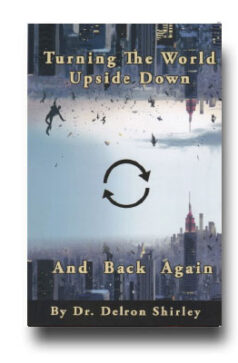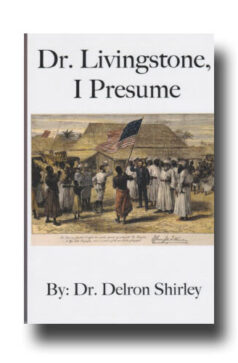When I was growing up, I would often hear the pastor preach about salvation, using terms like, “If I you die without Christ, you will split hell wide open,” or “Come to Jesus before it is everlasting too late.” With that kind of cohesion and very descriptive images of the lake of fire, I certainly grew up with a healthy respect for hell. In this study, I’d like take a look through the scripture to see what we can find about hell. Let’s begin with the story of the rich man and Lazarus.
There was a certain rich man, which was clothed in purple and fine linen, and fared sumptuously every day: And there was a certain beggar named Lazarus, which was laid at his gate, full of sores, And desiring to be fed with the crumbs which fell from the rich man’s table: moreover the dogs came and licked his sores. And it came to pass, that the beggar died, and was carried by the angels into Abraham’s bosom: the rich man also died, and was buried; And in hell he lift up his eyes, being in torments, and seeth Abraham afar off, and Lazarus in his bosom. And he cried and said, Father Abraham, have mercy on me, and send Lazarus, that he may dip the tip of his finger in water, and cool my tongue; for I am tormented in this flame. But Abraham said, Son, remember that thou in thy lifetime receivedst thy good things, and likewise Lazarus evil things: but now he is comforted, and thou art tormented. And beside all this, between us and you there is a great gulf fixed: so that they which would pass from hence to you cannot; neither can they pass to us, that would come from thence. Then he said, I pray thee therefore, father, that thou wouldest send him to my father’s house: For I have five brethren; that he may testify unto them, lest they also come into this place of torment. Abraham saith unto him, They have Moses and the prophets; let them hear them. And he said, Nay, father Abraham: but if one went unto them from the dead, they will repent. And he said unto him, If they hear not Moses and the prophets, neither will they be persuaded, though one rose from the dead. (Luke 16:19-31)
In this story, we see some very important points about the afterlife. The first thing that stands out is that Lazarus and the rich man were in close proximity to one another even though one was in torment and the other in bliss and there was a great gulf dividing them. This situation can be explained by studying the Old Testament term “sheol” that is generally translated “hell.” This Hebrew term is actually the designation of the place of the dead — regardless of whether they were righteous or wicked in their earthly lives. Apparently, sheol had two separate compartments — one was a place of torment for the wicked, and one was a place of peace and rest for the righteous. When Jesus responded to the thief who hung on the cross adjacent to His, He promised the penitent criminal that he would be with Him in paradise that same day. (Luke 23:43) Having traveled extensively throughout Asia, I can immediately relate to the term Jesus used to describe the place that He and the penetrant thief were to occupy that evening. In places like India, I’ve had the opportunity to visit a number of paradises — secluded gardens of tranquility surrounded by poverty and misery. These paradises — originally the homes of the maharajas and other members of the ruling class and aristocracy — are filled with lush vegetation, babbling brooks, splashing fountains, and musical songbirds. Yet, just outside the gates is life at its rawest — the maimed, diseased, starving, and abused of the world, doing their best to eke out a living or even exist to the end of the day. This same imagery is exactly what Jesus was trying to portray concerning the destiny of the righteous versus the fate of the wicked. Had the thief not turned to Jesus in hope for a better afterlife, he would not have joined Jesus in paradise; instead, he would have found himself outside the gates of paradise in the flames with the rich man from our story.
The significant point that I’d like to extract from this story is the fact that the rich man was totally conscious of all that was going on in the place of his torment, in paradise, and on earth. Contrary to much of the ideology that is promoted today, death is not a nirvana in which souls unconsciously float through ethereal space. The rich man was in torment and was totally cognizant of what was happening to him and why he was in that state. Additionally, he was totally aware of what was happening in paradise and was able to communicate with the people there. However, even though he was aware of the physical earthly dimension, he was not able to communicate with the people living in it. Similarly, the people in paradise were prohibited from interfering with the lives of those still on earth. In other words, there simply are no visits from the Ghost of Christmas Past!
Of course, this account occurred during the physical life of Jesus on Planet Earth. But all this changed dramatically after Jesus’ three-day sojourn in paradise. According to Matthew 27:52-53, many of the Old Testament saints came out of their graves and were seen around Jerusalem after the resurrection of Jesus on that first Easter morning. Coupling this fact with Paul’s description of Jesus’ burial and resurrection in Ephesians and Isaiah’s statement about hell, we can begin to piece together the scenario of events.
Wherefore he saith, When he ascended up on high, he led captivity captive, and gave gifts unto men. (Now that he ascended, what is it but that he also descended first into the lower parts of the earth? He that descended is the same also that ascended up far above all heavens, that he might fill all things.) (Ephesians 4:8-10)
Therefore hell hath enlarged herself, and opened her mouth without measure: and their glory, and their multitude, and their pomp, and he that rejoiceth, shall descend into it. (Isaiah 5:14)
All the Old Testament saints were held in paradise rather than being able to go to heaven since their salvation was not yet perfected because Jesus had not yet shed His atoning blood. (Hebrews 11:39-40) When Jesus arrived in paradise and announced that He was the one sacrifice that all their Old Testament sacrifices had symbolized and that He was the High Priest that all the Old Testament priesthood had predicted, He was able to complete their salvation and invite them to join Him in heaven. (Hebrews 10:1-18) Apparently, some of them stopped by to “check out their old haunts” as they passed through the earthly dimension on their journey from sheol to heaven. It seems logical that the torment side of hell spilled over into the space that paradise previously occupied once that area was vacated. (Isaiah 5:14)
In the New Testament, the term for hell is more specific and refers to a place of torment, not simply a place where the dead — both good and bad — are housed. We also learn that the origin of hell was a place for the devil and his fallen angels (Matthew 25:41) — not for humans. Perhaps the wickedness of mankind forced God to have to alter His original purpose and, therefore, to have to expand hell in order to accommodate the additional human inmate population. In one of His parables, Jesus spoke eschatologically of the final judgment saying that those who deliberately rebelled against the masters explicit and revealed will are to be beaten with many stripes while those who did not know the master’s full commandments yet committed offenses would be beaten with few stripes. This parable suggests that there are varying degrees of punishment in this “new and improved” hell. (Luke 12:46-48) Speculation as to how the punishment will vary and who will qualify for each level of torment is exactly that — speculation — and is far beyond the parameters of this present study.
There is one other thing that we should understand about hell before we move on to the next topic of consideration. Hell is not permanent. Before I ruffle too many feathers and get bombarded with Bible verses that proclaim that sinners are doomed to eternal punishment (Matthew 18:8, 25:46; Mark 3:29; II Thessalonians 1:9; Hebrews 6:2; Jude 1:6-7), let me hasten to explain that I didn’t say that there was an end to the judgment of the devil, his fallen angels, and the unsaved. What I said was that hell, just like sheol, is not the final step. The final abode of the wicked is the lake of fire (Revelation 19:20, 20:10, 14, 15; 21:8), a place of punishment designed for the antichrist, the false prophet, and all who follow them. This lake of fire and brimstone will engulf hell — and may even intensify the torment of the original hell!
Before we move on, let’s make a bit of a detour and make a short study of the cosmos of our universe. In II Corinthians 12:2, Paul wrote of a man who was caught up to the third heaven, which happens to be the heaven were God lives and rules from His throne room. If there is a third heaven, there must obviously be a first and second as well. But what are they? Well, it is easy to see that the first heaven is the atmosphere around us — the heavens through which the birds, planes, and Superman fly. (Pardon me; I just couldn’t stop myself.) But the identity of the second heaven can be an enigma wrapped up in a puzzle unless we have a bit of spiritual insight. In order to begin to unwrap this mystery, let’s take a quick journey back to the days of Elisha the prophet. At one point in his ministry, the Syrian army surrounded him and intended to capture him. When the prophet’s servant peeked out the door, he discovered the massive troop encampment and reported the dire situation to his master. Elisha replied that there was nothing to fear since there were more on their side than in the enemy’s army. The servant replied that he wasn’t exactly the brightest student in his math class but that he could count well enough to see that there were only two of them and hundreds of the others. Finally, Elisha prayed and asked the Lord to open his servant’s eyes so that he could see that the mountain was full of horses and chariots of fire. (II Kings 6:17) Apparently, what the servant saw was the angelic host that the Lord had sent to encamp around the prophet as his protection. But it is also obvious that these angelic hosts operated in the same time-space continuum as the physical world although they were usually not visible. What happened that day was that God supernaturally removed the dimension wall that separates the first heaven (the physical atmosphere in which we live) and the second heaven (the spiritual world were demons and angels dwell). When we remember that Satan is called “the prince of the power of the air” (Ephesians 2:2), we can readily surmise that he must have a spiritual system of power organized in the atmosphere of our planet even though we are not able to see him and his forces. Adding to this understanding that there are at least four references in scripture to the fact that spiritual dominion is exerted in heavenly places (Ephesians 1:3, 20; 2:6; 3:10), it becomes apparent that the second heaven occupies the same space as does the first heaven yet is distinguished from the first heaven in that it is of a spiritual nature rather than a physical one.
Revelation chapter twelve suggests a three-stage progression in the devil’s demise. First, he was kicked out of the third heaven in verses three and four. This is the same event discussed in Isaiah chapter fourteen, Ezekiel chapter twenty-eight, and in Jesus’ reference to his lightning-like fall (Luke 10:18). In this expulsion from the third heaven, he fell to the earth and took his place of authority in the second heaven. In verses seven through twelve, we see a second conflict in which he is cast out of the second heaven. Though many Bible teachers would claim this to be a continuation of the original conflict, careful observation of the details of the story would place this struggle at a much later date. First of all, he is described as the one who deceives the whole world, something he was not able to do before his original fall in that the humans had not yet populated the world and his first act of deception occurred in the Garden of Eden after his expulsion from the third heaven. He is also called the one who accuses the brethren, again, a charge that could only be levied against him after the Garden of Eden experience. Another significant fact is that a voice from heaven announced that salvation, the strength and the kingdom of God, and the power of Christ had come — a proclamation that was totally out of place at the time of the fall of Satan from the third heaven. Rather than being a time of salvation and celebration, it was actually the beginning of the period of conflict and torment for the human race. Additionally, we must note that the scriptures state that the devil recognized that his time is short — another contradiction of facts if this passage is speaking of the original fall of Lucifer. Instead, this passage seems to make reference to the end of his time as the devil rather than his initiation as Satan. Taking all these factors into consideration, it seems likely that the verses are referring to an event which has not yet come to pass — a time when Satan and his demonic associates will be cast out of the second heaven. When this happens, they will no longer have the advantage of invisibility and will be exposed for who they are — an astonishing confirmation of the words of both Isaiah and Ezekiel. “They that see thee shall narrowly look upon thee, and consider thee, saying, Is this the man that made the earth to tremble, that did shake kingdoms; That made the world as a wilderness, and destroyed the cities thereof; that opened not the house of his prisoners?” (Isaiah 14:16-17) “I will bring thee to ashes upon the earth in the sight of all them that behold thee. All they that know thee among the people shall be astonished at thee: thou shalt be a terror, and never shalt thou be any more.” (Ezekiel 28:18-19) His sojourn in the first heaven will apparently be very short as it gives way to his final expulsion out of all three heavens to the hell of the lake of fire.
One interesting question could be raised in regards to the coming judgment of Satan and his angels. According to II Peter 2:4 and Jude 6, at least part — if not all — the fallen angels are already cast down to hell and are delivered into chains as they await their final judgment. If this is the case, then why are they still a threat to us? Even though these demonic forces are bound, there is no mention that they are also gagged. In other words, their opportunity for physical harassment may be abated, but their ability to speak and inundate the world with their lies has not yet been squelched. (Revelation 12:15) To comprehend the power that words can have even when the speaker is physically restrained, just think of the effect of Paul’s epistles that he wrote while occupying a long series of jail cells across the Roman Empire or the impact of Pilgrim’s Progress that has been translated into more than two hundred languages and has never been out of print since John Bunyan penned the allegory in England’s Bedfordshire County Jail in 1678. The power of these chained spirits has little to do with how strong or numerous they are but what they are able to say and cause us to believe.
Well, let’s get back to the preacher who was threatening that the unrepentant were going to split hell wide open. In relationship to this topic, I’d like to consider two questions: “Who is it that will wind up in hell?” and “How can I make sure that I’m not one of them?”
Of course, we already know that the devil, his angels, the antichrist, the false prophet, and those who followed them are already darned to a destiny in heck. Revelation 21:8 adds to that list — the fearful, the unbelieving, the abominable, murderers, whoremongers, sorcerers, idolaters, and all liars. The question to consider here is whether it is these specific sins that will doom individuals to hell or if these infractions are simply listed as a sampling to help us understand what general types of people will meet this eternal fate. Many Bible teachers contend that it is not individual sins but the general sin nature that takes people to hell. However, the scripture is very clear that the sacrificial death of Jesus was to deal with sins — specific acts of sinfulness. (I Corinthians 15:3; Galatians 1:4; Ephesians 1:7; Colossians 1:14, 2:13; I Timothy 5:24; Hebrews 1:3, 2:17, 8:12, 9:28, 10:12, 17; James 5:15; I Peter 2:24, 3:18; II Peter 1:9; I John 1:9, 2:2, 12, 3:5, 4:10; Revelation 1:5) However, it seems obvious in the New Testament that the judgment for the specific sins is actually little more than the symptom of a much deeper evaluation. The acts of sin are really little more than a barometer to read the heart relationship of the individual being examined. The born-again believer is totally liberated from the power of sin, “Knowing this, that our old man is crucified with him, that the body of sin might be destroyed, that henceforth we should not serve sin.” (Romans 6:6) The degree to which he lives — or fails to live — in that liberty is an indicator of how serious he really is about his relationship with Christ.
Let not sin therefore reign in your mortal body, that ye should obey it in the lusts thereof. Neither yield ye your members as instruments of unrighteousness unto sin: but yield yourselves unto God, as those that are alive from the dead, and your members as instruments of righteousness unto God. For sin shall not have dominion over you: for ye are not under the law, but under grace. What then? shall we sin, because we are not under the law, but under grace? God forbid. Know ye not, that to whom ye yield yourselves servants to obey, his servants ye are to whom ye obey; whether of sin unto death, or of obedience unto righteousness? But God be thanked, that ye were the servants of sin, but ye have obeyed from the heart that form of doctrine which was delivered you. Being then made free from sin, ye became the servants of righteousness. (Romans 6:12-18)
Through the redemptive work of Christ on the cross, believers have been freed from two debilitating bondages — the law and sin. No longer do we live under the fearful bondage of the law, always worrying if we have done enough good works to earn our way to heaven. Additionally, we are no longer under the fearful bondage to sin, always worrying if we have committed so many sins that we will be sent to hell. These are two realities that are difficult for many Christians to understand in proper balance with the fact that God is a holy God who expects righteousness from His children. It is easier to “fall into the ditch on one side of the road or the other” than to drive “straight down the middle.” Some believe that once a person is saved his eternal destiny is irrevocably sealed no matter what he may do. People who hold this opinion stress such verses as John 10:28, “And I give unto them eternal life; and they shall never perish, neither shall any man pluck them out of my hand.” Their emphasis is that if you are saved, there is nothing that can get you “unsaved.” Those on the other end of the argument like to prove their point by citing verses that state that a person can go away from his state of grace after being saved:
As a dog returneth to his vomit, so a fool returneth to his folly. (Proverbs 26:11)
Christ is become of no effect unto you, whosoever of you are justified by the law; ye are fallen from grace. (Galatians 5:4)
For it is impossible for those who were once enlightened, and have tasted of the heavenly gift, and were made partakers of the Holy Ghost, And have tasted the good word of God, and the powers of the world to come, If they shall fall away, to renew them again unto repentance; seeing they crucify to themselves the Son of God afresh, and put him to an open shame. (Hebrews 6:4-6)
For if we sin wilfully after that we have received the knowledge of the truth, there remaineth no more sacrifice for sins. (Hebrews 10:26)
He that overcometh, the same shall be clothed in white raiment; and I will not blot out his name out of the book of life, but I will confess his name before my Father, and before his angels. (Revelation 3:5)
And if any man shall take away from the words of the book of this prophecy, God shall take away his part out of the book of life, and out of the holy city, and from the things which are written in this book. (Revelation 22:19)
The people who don’t believe that a Christian’s sinful acts can darn him to heck respond by trying to explain that these people who forsake the Lord were not actually saved in the first place — they only seemed to be Christians. They interpret certain verses such as I John 2:19, “They went out from us, but they were not of us; for if they had been of us, they would no doubt have continued with us: but they went out, that they might be made manifest that they were not all of us,” to mean that these people were only pretenders to start with and were only showing their true colors when they went away. The reply from the other side is that II Peter 2:20-22 explains that these people who abandoned the faith were indeed described as having really known the Lord and having been saved from their sinfulness.
For if after they have escaped the pollutions of the world through the knowledge of the Lord and Saviour Jesus Christ, they are again entangled therein, and overcome, the latter end is worse with them than the beginning. For it had been better for them not to have known the way of righteousness, than, after they have known it, to turn from the holy commandment delivered unto them. But it is happened unto them according to the true proverb, The dog is turned to his own vomit again; and the sow that was washed to her wallowing in the mire.
The conclusion of the argument is that the Bible teaches neither eternal security nor eternal insecurity. It doesn’t teach that a person can live any way he wishes, believe anything he wants, or act any way he desires — and still be saved. On the other hand, it does not teach that God is ready to erase a believer’s name from the Book of Life at any minor infraction of the rules. Careful reading of the passage in Hebrews chapter six and the verses in II Peter chapter two reveal that the Bible is talking about a serious and deliberate rejection of the Lord — not just accidental sins. The Hebrews passage uses the Greek word that is the root for the English word “apostasy.” To commit apostasy is a deliberate rejection of the Lord and the conviction of the Holy Spirit resulting in an irreversible separation from God. Therefore, it seems that the essence of the matter is, as was already stated, that even though people are judged for their actual acts of sin, these actions are only used as indicators of how serious the individual is about having and maintaining a relationship with Christ.
With this in mind, we can ask the final question, “How can I ensure that I am not going to be darned to heck?” Romans 10:9-10 makes it simple and plain: “That if thou shalt confess with thy mouth the Lord Jesus, and shalt believe in thine heart that God hath raised him from the dead, thou shalt be saved. For with the heart man believeth unto righteousness; and with the mouth confession is made unto salvation.” Even though it is our sins that have separated us from God and were the issue that was dealt with on the cross, they are not the barrier that blocks our entrance into the kingdom of God or the warrant that darns us to heck. The whole matter centers around whether we have a genuine heart relationship with Jesus that is sincere enough to lead to a public proclamation of that faith. It’s as simple as that! Believe — not just through mental assent, but because that’s what you really stake your whole life on in the very core of your being — that Jesus went to the cross to deal with your past and rose again with total victory and authority to establish your future. Confess — not just through saying the words, but through your total lifestyle — that Jesus is lord over your thoughts, words, deeds, and destiny. And you will be saved from the possibility of ever “splitting hell wide open” or ever being darned to heck!










